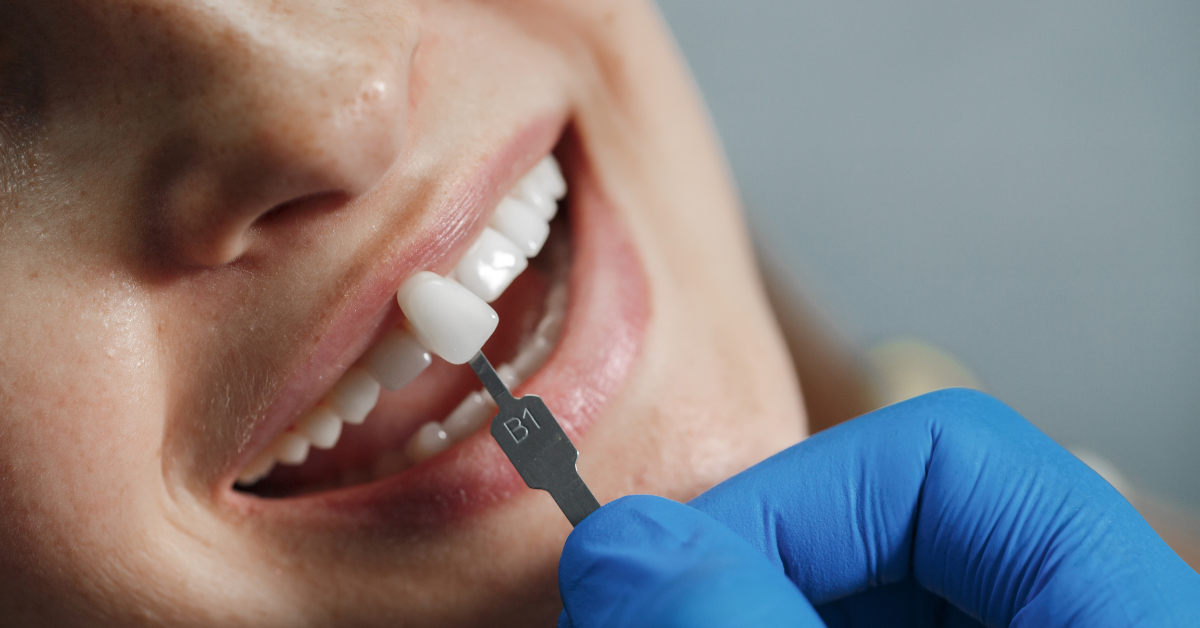
Teeth Whitening vs. Veneers: Which One is Best and Why?
Introduction
A shiny, white tooth not only boosts your confidence but also leaves a mark on others. Yet teeth can stain over time because of things like coffee, red wine, smoking, and natural aging. If you want to improve your smile, you probably would want to get some information such as:
- Teeth whitening versus veneers: Which really is better?
Both treatments were designed to improve your smile, but they work in totally different ways. Teeth whitening brightens your natural teeth while removing stains. A veneer is a thin shell that covers the whole front surface of the tooth, producing an immaculate and stain-resistant look. And of course, the fact remains that teeth whitening will not work on veneers and crowns, hence, special treatment is necessary to retain their brightness.
In this guide, you would find teeth whitening vs. veneers comparison as it discusses this procedure and pros and cons, costs, and processes to help make that right decision for you regarding the suitable option according to your dental goals.
What is Teeth Whitening?
Teeth bleaching is an actual dental treatment that would lighten the dental shade by removing stains and discoloration. It is a procedure that is safe and non-invasive and enhances a smile. The significance of teeth whitening is classified into two categories:
- In-Office Professional Whitening:
This is done by a dentist using higher concentration hydrogen peroxide or carbamide peroxide. It has a quick and dramatic result with the least discomfort, sometimes also coupled with LED lights or laser activation, e.g., Zoom! Whitening, or bio-lase LASER whitening. - At-Home Whitening Kits:
Includes OT-counter products such as gels, strips, and trays. The result is slower than a professional treatment. Daily maintenance is essential if one wants to keep the effect for some time.
Best for:
Eliminating stains on surfaces originated from coffee, tea, wines, and smoking.
Those who want an inexpensive and non-invasive way to get a brighter smile.
What Are Veneers?
The veneers are thin shells custom made of porcelain or composite resins bonded to the front surface of teeth to improve their appearance. They represent a permanent solution for improving teeth in shape, color, and alignment. They can correct severe discoloration not amenable to whitening; chipped, cracked, or uneven teeth; gaps and minor misalignment.
Types of Veneers:
- Lithium Disilicate (eMax) Veneers
Strong, stains well, and looks natural.
They may last for 10-15 years if cared for properly. - Composite Veneers
Less expensive but less durable than lithium disilicate.
Typically last 5–7 years.
Best indicated for:
Deep intrinsic stains that whitening can't fix.
To correct things like shape, size, and alignment of the teeth for a perfectly contoured
smile.
Teeth Whitening vs. Veneers: Key Differences
Here's a quick comparison to help you decide:
| Feature | Teeth Whitening | Veneers |
|---|---|---|
| Purpose | Brightens natural teeth | Covers imperfections and discoloration |
| Longevity | 6 months to 3 years | 10–15 years (porcelain) |
| Cost | ₹5,000 – ₹25,000 | ₹8,000 – ₹20,000 per tooth |
| Procedure Duration | 1–2 sessions or 2–4 weeks (home kits) | 2–3 dental visits |
| Sensitivity | Temporary sensitivity | Mild post-procedure sensitivity |
| Reversibility | Reversible | Irreversible (removes enamel) |
| Maintenance | Requires touch-ups | Requires regular oral hygiene |
| Suitability for Sensitive Teeth | May cause sensitivity | Minimal sensitivity post-procedure |
| Hides Imperfections | No | Yes, hides cracks, gaps, and stains |
| Whitening for Crowns/Veneers | Not effective | Cannot be whitened, may need replacement |
Teeth Whitening vs. Veneers: Which One is Best for You?
- Budget
Tooth Whitener: More affordable for those wishing for temporary, quick results.
Veneers: Higher initial costs but give long-term cash savings as they last longer. - Longevity and Durability
Whitening requires touch-ups every six to 12 months.
"Veneers" last over 10 years using proper care, making them a more permanent fix. - Desired Results
Brightening is best for whitening mildly discolored teeth.
Better source: Veneers for covering imperfections or deep stain sources. - Considerations of Sensitivity
Whitening teeth may cause some temporary sensitivity.
Veneers initially induce some pain but are less likely to induce any long-term sensitivity.
How to Whiten Veneer Teeth?
Veneers, crowns, and other restorations cannot undergo conventional whitening treatments. However, they can be maintained by doing the following:
- Regular brushing with a non-abrasive toothpaste will prevent surface stains.
- Limiting the intake of stain-causing foods and drinks, such as coffee, tea, and red wine.
- Getting professional cleanings regularly to remove buildup and retain shine.
- Using whitening toothpaste will maintain the natural teeth from becoming discolored and mismatched with the veneers.
Teeth Whitening for Crowns and Veneers: Is It Possible?
Teeth whitening does not work on crowns, veneers, or fillings because these materials do not respond to bleaching agents. Unlike natural teeth, which can be lightened through whitening treatments, crowns and veneers retain their original shade. The only way to improve their appearance is by replacing them to match the desired tooth color. If you're concerned about color matching after whitening, it's best to discuss replacement options with your dentist.
Conclusion: Which is the Best Option?
When deciding between teeth whitening and veneers, the best choice depends on your goals, budget, and dental needs. Teeth whitening is a cost-effective, temporary solution for brightening natural teeth, while veneers offer a long-lasting and versatile option for correcting imperfections such as discoloration, chips, and misalignment.
To determine the best solution for achieving your perfect smile, consult with Radiant Smiles Dental Clinic. Our dental professionals will guide you through your options and help you make an informed decision to enhance your smile.
FAQs: Teeth Whitening vs. Veneers
- Is teeth whitening safe for sensitive teeth?
Yes, but individuals with sensitive teeth may experience discomfort during or after whitening. Desensitizing toothpaste or shorter treatment durations can help reduce sensitivity. - Can veneers be whitened after they are placed?
No, veneers cannot be whitened after placement. If the color of the veneers changes over time, they may need to be replaced. However, usually veneers are resistant to color change. - How long does teeth whitening last?
Professional teeth whitening can last between 6 months to 3 years, depending on your habits and oral hygiene. - Are veneers permanent?
Yes, veneers are a permanent solution. Since a little bit of enamel is removed to place the veneers, the procedure is irreversible. - Which option is better for fixing chipped or uneven teeth?
Veneers are a better option for fixing chipped, cracked, or uneven teeth. They provide a natural and uniform appearance. - Can I whiten my veneers at home?
No, veneers cannot be whitened with at-home kits or professional bleaching. To maintain their brightness, practice good oral hygiene and avoid stain-causing foods. - Does teeth whitening work on crowns and veneers?
No, teeth whitening treatments are ineffective on crowns and veneers. To maintain a consistent shade, it's best to replace them if they become discolored. - How can I maintain the whiteness of my veneers?
To maintain the whiteness of veneers:
- Brush and floss regularly.
- Avoid staining foods and drinks.
- Schedule regular dental cleanings.
- Use a non-abrasive toothpaste.

